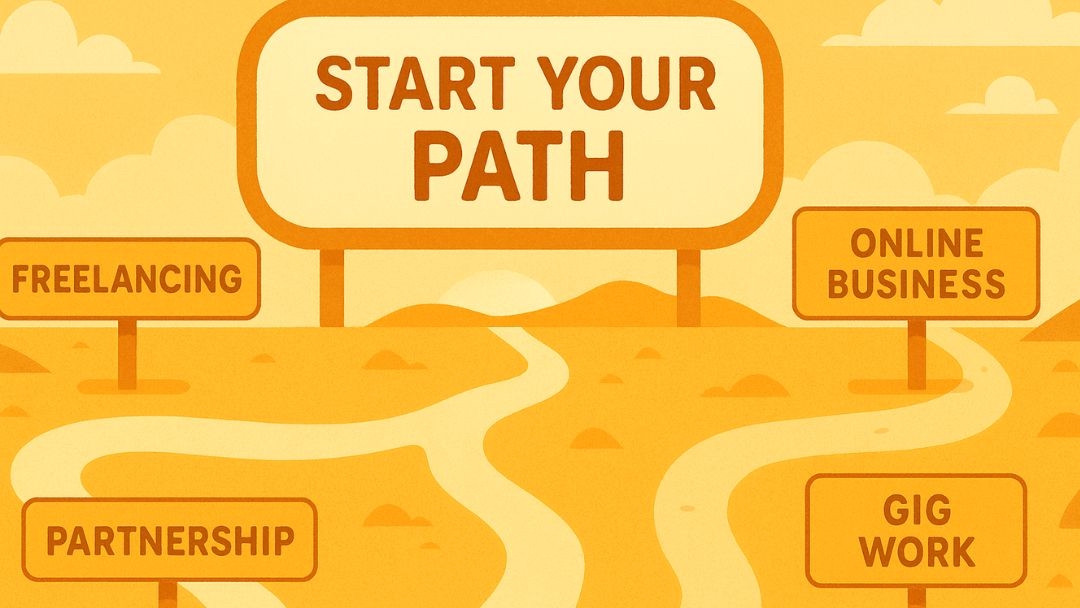Entrepreneur Personality Test: Do You Have What It Takes to Be an Entrepreneur?
Entrepreneurship is deemed by many as a rosy road to a picturesque way of life. But is it for everyone? An entrepreneur test is one of the best ways to unravel whether entrepreneurship is your best career path. How many characteristics do you have?


Back
12 mins read
What do Oprah Winfrey, Warren Buffet, Mark Cuban, Richard Branson, Jeff Bezos, and Elon Musk have in common? Other than being some of the wealthiest people in the world, they've shown us that entrepreneurship pays — really good.
Entrepreneurship is one of the best ways to get a picturesque life. But most of these people listed have often said the road to the top of the pinnacle hasn't been easy.
The truth is that entrepreneurship is not for everyone; it's a path that demands time, finances, effort, accountability, and the ability to embrace failure.
Do these characteristics describe you? Do you have a burning desire to pursue entrepreneurship? Or have you already embarked on your entrepreneurial journey but are doubting whether it's your right career path?
Learning your personality type is an excellent place to start. It not only helps you to identify your strengths and shortcomings, but it also helps you understand whether you are indeed cut out to be your own boss.
This article will explore what it takes to be an entrepreneur and delve into some of the best tests to help you determine whether you’re well suited for it.
But first, some basics.
What Is an Entrepreneur?

An entrepreneur is a person who sets up a business around an idea or innovation intending to make a profit. These individuals are determined to start from scratch, taking up all the risks — and investing time and effort — until it fails or makes it. But many people are only attracted to the “top of the iceberg” facade of success.
Yet, compared to a regular job, the entrepreneurship process is time-consuming, demanding, and stressful.
What keeps an entrepreneur going is their motivation. Research shows that most entrepreneurs are motivated to build something independently and be their own boss, with only 8% of entrepreneurs citing money as their primary motivation. Further, according to the US Census Bureau statistics, an average of 436,000 new business registrations occur every month, making it clear that many people believe entrepreneurship is a promising career.
Why Would I Want to Be an Entrepreneur?

Since you're here, for one reason or another, you've mulled over why you should exit your current job and venture into entrepreneurship. If the reasons below resonate with you, it may be time to jump ship.
Dissatisfaction at Your Current Workplace
Is your regular job stressful? Is it a toxic work environment? Probably because of long working hours, poor pay, or a bad boss? Or are your creativity and problem-solving skills severely hampered, and you can barely keep it together?
Maybe you've taken a career assessment test, and it affirms that a career change is long overdue.
It's one of the major reasons why people quit their regular jobs to venture into the business world. If you've learned the ropes, the good and bad lessons, and developed the necessary skills as an employee, taking the next step to do what you love on your terms comes naturally.
Financial Freedom
As we discussed earlier, starting a new venture can be stressful. Molding an idea, insight, or innovation into a marketable product and acquiring funding, with a possibility of failure looming, is nerve-wracking for anyone.
But the spoils are huge for the entrepreneur who peers through their way to success. There’s no limit to how much life-changing money you can make. You can increase your earnings by raising the prices, selling more products, exploring new markets, automating, or developing complementary goods or services.
Indeed, entrepreneurship can free you financially.
Work Clashes with Who You Are
Your personality influences your thoughts, feelings, and actions in different situations. But more importantly, it also affects how you react to conditions at the workplace. Who you are as an individual may not be suited for every job. If creativity and innovation excite you, staying behind a desk with paperwork is a perfect example of a personality-job mismatch. Many younger Gen Z workers and Millennials are drawn to entrepreneurship because it allows them complete control of their time, something that is important to them.
When you work in a job you dislike, frustration and burnout set in, and in the long run, severe career dissatisfaction. On the flip side, individuals who match their personalities and careers are happier, more productive, and make more financially.
What Are the 4 Types of Entrepreneurship?

Oprah is a different businessperson than Jeff Bezos is. Different motivations fuel different people. While they may have overarching characteristics, their businesses revolve around their unique passions and aspirations.
Let’s delve deeper into each of the four main entrepreneur types.
Social Entrepreneurship
Social entrepreneurs seek to solve societal problems such as economic and social inequality and environmental concerns. Some social entrepreneurships can run as non-profits, and others as profitable businesses that give back to the community. Social entrepreneurs largely base their success on the progress made towards an issue, not profit generation.
Scalable Startup Entrepreneurship
Scalable startup entrepreneurship focuses on creating innovative ideas that meet a market need. These are the people that typically start in the dorm room or garage. They look to scale their businesses quickly, often through venture capitalist funding, to make exponential profits. The key metrics for scalable startup entrepreneurs include conversion rates and gross margins.
Small Business Entrepreneurship
These are the local businesses such as flower and coffee shops where the owners seek to make a profit to support their family and their lifestyle. They are not typically focused on scaling the business. However, there's potential for it to grow into a large company if a large company buys them or if they adopt the franchising scaling model.
Large Company Entrepreneurship
Businesses that have gone through finite cycles are considered large companies. These entrepreneurs look to expand their existing business model, acquire the right talent, create organizational systems, and increase their customer base to sustain company growth and lifestyle.
What Are the Personality Traits of an Entrepreneur?

Entrepreneurs come from all walks of life with different personalities and aspirations. However, there are a host of personality traits that entrepreneurs share that help them run successful ventures.
Here are four of the most common entrepreneur personality characteristics:
Leadership
Leadership is the glue that keeps everything together.
Entrepreneurs lead their teams toward achieving their objectives by effectively communicating their vision and providing resources, guidance, and motivation. But leadership also touches on honesty, the ability to make hard decisions, and providing an environment for team members to learn and thrive. As a leader, you must master how to share the limelight and recognize that success rarely comes from solo input but from a collective team effort.
Creativity
Entrepreneurs have a knack for creating creative ideas that turn into successful ventures.
They challenge the status quo, ask difficult questions, and explore different avenues to develop valuable discoveries that differentiate them from other companies and propel them to success.
Discipline
Discipline keeps entrepreneurs accountable.
It allows them to make decisive actions and execute plans at the right time. For instance, maintaining a clear time management strategy motivates them to achieve goals within the set timelines without external factors holding them accountable. Discipline eliminates procrastination improving productivity which gives them a competitive edge.
Emotional Intelligence
Emotional intelligence revolves around managing your emotions and showing empathy towards others. Successful entrepreneurs capitalize on social intelligence to build genuine and quality relationships with their teams and with other players in their industry circles.
These soft skills also help them to anticipate their customers’ needs leading to better customer loyalty and increased employee productivity.
This list is by no means exhaustive. Other traits associated with entrepreneurs include resilience, confidence, charisma, resourcefulness, and adaptability.
Is There a Way to Know if I Can Be an Entrepreneur?
While there are no guarantees that anyone will be a successful entrepreneur, you can take steps to identify whether or not you have a better-than-average chance. While everyone can be in business for themselves, not everyone will stick it out. And believe it or not, some people are better suited for being employees.
We've established that entrepreneurship is not for the faint-hearted. Before taking the plunge, you may need some reassurance that you're ready to make the transition. So, how do you assess yourself to know if you can be an entrepreneur?
The following are some of the best ways to discover your full entrepreneurial capabilities:
- Mentorship — through mentorship and internship, you can acquire the experience required for fields you may want to venture into.
- Research — involves acquiring relevant entrepreneurship information, including the skills required to run a successful venture.
- Know Your Values — exploring your personal work values is essential to be successful as your own boss.
- Personality Test — a personality test gives you detailed insights on your entrepreneurial abilities and rubber stamps all your research findings and your mentorship discoveries so that you can make a successful entrepreneur!
- Conduct a SWOT — a personal strengths, weaknesses, opportunities, and threats analysis will uncover essential information about both yourself and the viability of your business idea.
What Is an Entrepreneur Personality Test?

An entrepreneurial personality test is a science-based assessment that provides information on your personality traits that are beneficial and crucial to making you a successful entrepreneur and the traits that can impede your goals.
The test measures your traits against the common traits successful entrepreneurs share.
After completing the test, you not only gain a better understanding of yourself, but you also gain clarity and the motivation to start.
You may wonder, "Is my personality fit to handle the challenges of entrepreneurship?" How can I assess my entrepreneurial competencies? A personality test can capture all the details you need and more. Are you a struggling entrepreneur? The good news is it's never too late to learn the business strengths you can scale and the weaknesses you can improve on to turn your fortunes around.
But what is the best test of a successful entrepreneur?
Truthfully, time is the only test that will truly show whether someone will be successful as their own boss. But there are objective tests that can identify characteristics that are associated with entrepreneurial achievement.
Dozens of personality tests can deliver fascinating insights into your personality. But not all of them can help you discover your entrepreneurial traits. Here are the four most popular tests that delve deep into your strengths, weaknesses, and tendencies to deliver the most detailed entrepreneurial insights about your personality.
Holland Codes and Entrepreneurial Style
The Holland Codes Assessment looks closely at how career interests are connected with job satisfaction, performance, and success. It's one of the most extensively examined tests, and many people around the globe rely on its insights to make career-defining decisions.
While this test was originally designed for career planning, it can also be used to help determine the type of entrepreneurship that best fits you. After all, it stands to reason that you will be more successful and enjoy what you are doing more if you start a business in a field that matches your interests and personality type!
Test creator John Holland found that people can fit into six main personality types related to career choice: Realistic, Investigative, Artistic, Social, Enterprising, and Conventional.
But due to the complexity of human nature, it's possible to find a bit of yourself in a few categories. Therefore, the test does not give you full results in a single score. Instead, it shows you how strongly you relate to the different types.
Here’s a breakdown of the six pure Holland types and the entrepreneurship styles they present:
- Realistic — these people are problem-solvers and prefer hands-on kinds of businesses. Such jobs may include construction, machinery, and IT-oriented ventures.
- Investigative — as the term suggests, they are analytical, scientific, and critical thinkers. They ask difficult questions and thrive in solving them. Such entrepreneurs prefer to start businesses such as science labs and research firms.
- Artistic— these personalities see themselves as original creators. They possess great artistic abilities and thrive in the art, writing, and music industries.
- Social — if helping people and solving social problems gives you satisfaction, then you are a perfect fit for this category. Teaching, nursing, and counseling entrepreneurial ventures are your best bet for success.
- Enterprising — these are success-oriented personalities that love selling things and ideas. Entrepreneurs in this category prefer starting enterprises like talent acquisition, advertising, and marketing agencies.
- Conventional — these are organized entrepreneurs who like to work with numbers and data in a structured way. Businesses such as data administration, accountancy, and underwriting are good for this category.
The Big Five and Entrepreneurial Style
The Big Five bases its model on the premise that every person possesses five core traits. The Big Five looks at these characteristics across a continuum, where you get 5 different scores. By understanding your core traits, you can better choose an entrepreneurship journey you’ll enjoy.
We cover how your Big 5 traits affect your entrepreneurial style in more detail in this article, but here’s some quick information.
- Openness — High scores on the openness vs. closedness trait represent individuals open to experiences, trying new things, and offering creativity. They prefer to start businesses attached to creativity or new ideas like design, art, and fashion.
- Conscientiousness — High scores in conscientiousness indicate people who are highly organized and follow through with their well-laid plans. Their self-discipline and mindfulness traits incline them to accountancy and science-based research businesses.
- Extroversion — Extraverts are individuals who like to be the center of attention. Socializing, making friends, and expressing themselves is their strongest trait. They can run successful businesses in areas like public relations, acting, modeling, and event planning.
- Agreeableness — Very agreeable individuals are selfless, empathetic, caring, and ready to help others. They can thrive in social entrepreneurship or profit businesses like therapy, counseling, or education centers.
- Neuroticism — People who score high in neuroticism often suffer emotional instability and can't cope well when faced with challenges. Laid-back ventures that cause fewer worries, like a yoga studio, massage parlor, and freelancing, are their best business picks.
Myers-Briggs and Entrepreneurial Style
The Myers-Briggs Personality Test analyzes your traits concerning how you relate with yourself, others, and the world. The MBTI tests your preferences in four key dimensions:
- Extraversion (E) and Introversion (I)
- Sensing (S) and Intuition (I)
- Thinking (T) and Feeling (F)
- Judging (J) and Perceiving (P)
Based on the results, you’re placed in one of the 16 personality types with a unique four-letter code. Researchers have connected four of the types to entrepreneurship.
This is not to say that other MBTI types can’t be successful. It’s just that studies show that these Myers-Briggs types are the most common among entrepreneurs — ENTP, ENTJ, ESTJ, and INTJ.
- ENTP: Fearless, Charismatic, and Outspoken Debaters — These are curious and innovative individuals who love challenging discussions and debates about big ideas. They create businesses in spaces that embrace creativity, like film, fashion, consulting, and more.
- ENTJ: Analytical, Quick-Witted, and Natural-Born Leaders — ENTJs are capable of communicating their vision and leading their team toward achieving strategic goals. Finance, consulting, and marketing are just some of the best spaces for them.
- ESTJ: Enthusiastic and Action-Oriented Directors — these are cautious individuals who choose to evaluate business ideas based on data and reliable information. They prefer real estate, stock brokerage, insurance, and other data-oriented industries.
- INTJ: Independent Thinkers and Natural Problem Solvers— INTJs are learners and innovators looking for opportunities to solve big problems and make a profit. They thrive in industries like energy, big tech, blockchain, online payment systems, and business consulting.
Enneagram and Entrepreneurial Style
The Enneagram is another test that can provide insight and help you identify your entrepreneurial abilities and preferences. The Enneagram is different from many other personality assessments because it examines the motivations, desires, and fears that drive your actions.
We covered how the Enneagram can be used to identify the unique values, intentions, and goals that motivate you as a business owner or entrepreneur in this article.
Benefits of the Entrepreneur Personality Test

An entrepreneur personality test is a simple way to discover what triggers your business preferences and general behavioral patterns. If you take a career assessment test, you open up yourself to the following benefits:
- Identifying the strengths that you can capitalize on
- Identifying the weaknesses that require improvement
- Avoiding pitfalls
- Fostering better team communication and collaboration
Is Entrepreneurship for Me?
The answer to whether entrepreneurship is for you will depend upon many factors. Can everyone be an entrepreneur? Yes. Will everyone be successful? No, and it’s not just about their personality type! For example, determination can go a long way in overcoming other shortcomings.
While some personality traits identified by the Holland Assessment, Big Five, Myers Briggs, and Enneagram are more likely to make you a strong contender, all the types can also make a big break in entrepreneurship.
Simply put, there's room for everyone. If you put in the work. The benefit of understanding your personality traits is that it can give you a leg up — identifying your strengths and weaknesses and guiding you towards endeavors where you are more likely to succeed.
What's crucial is to find the entrepreneurial space that matches your core interests and identity.
If you start a business you're not passionate about, you've created another "job," and it will only leave you miserable and frustrated.
Is It Too Late To Be an Entrepreneur?

It’s never too late to change your career or start your own business. At first, it can seem intimidating — especially if you've worked for years or decades in a particular profession — but the switch is well worth it.
If you are truly unhappy where you are, are tired of building someone else's dream, or simply want something different, you can make the transition and use your talent and creativity to start a business that changes your life and that of your family, and maybe even the world
With proper research, including knowledge about your entrepreneurial personality, adequate preparation, determination, and resilience, you can start your entrepreneurship journey today.
How Else Can I Be Self-Employed?

If starting a business is just not cut out for you, but you would still like to enjoy the benefits of being self-employment, here are some ideas that you can try:
Freelancing
Freelancing is the easiest way to become self-employed. And there is no limit to what you can do —design, pet walking, writing, consulting, hanging wallpaper, and so much more! If you have a skill, it’s likely someone out there needs it.
Partnership
You can join a startup in a field that interests you as a general or a limited liability partner. Through a partnership, you can combine efforts with a like-minded person(s) and share in the various angles of self-employment.
Set Yourself Up for Victory with an Entrepreneur Quiz
Entrepreneurship can be a big opportunity that changes your life for the better. By learning about your personality, you choose the right path that sets you up for triumph.
Take an entrepreneur quiz today and begin your journey to total freedom!


Return to Blog




